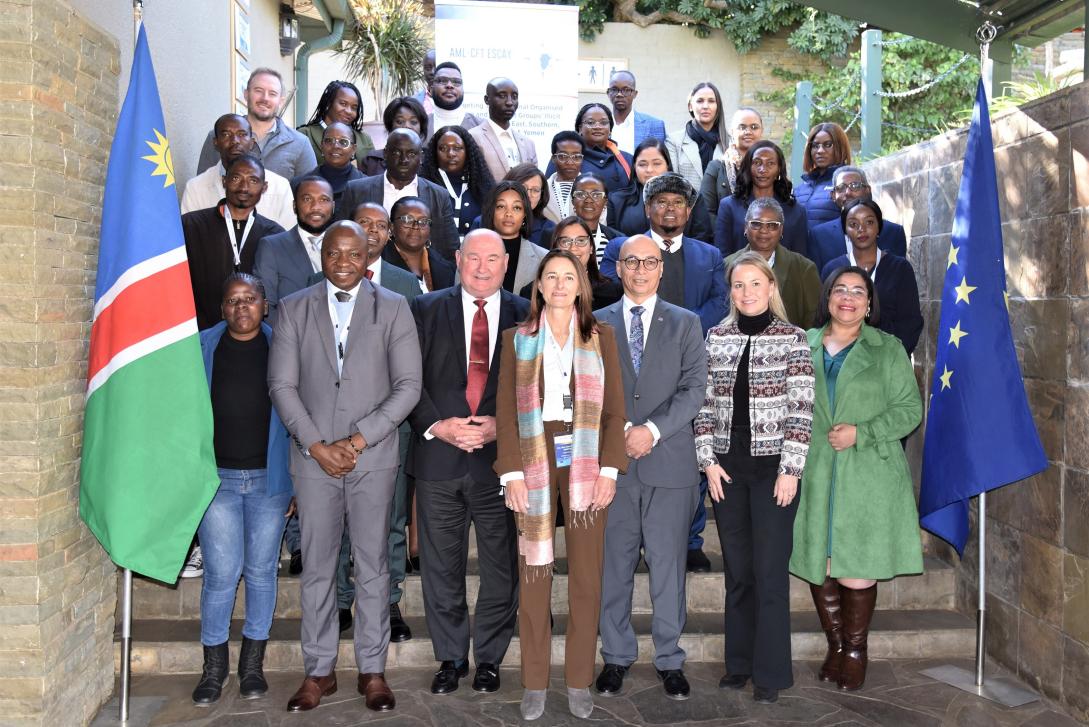EU supports Namibia to tackle money laundering, terrorist financing and related crimes

This training workshop is organised in collaboration with Namibia’s Financial Intelligence Centre (FIC). After being placed on the grey list in February this year, Namibia requested the European Union Delegation (EUD) in Windhoek and the EU-funded AML-CFT ESCAY Project agreed to provide Technical Assistance to address the shortcomings that led to her grey listing.
Running throughout this week (08 - 12 July 2024), this training workshop is expected to build the capacity of the attending officials, to enable Namibia to sufficiently implement the necessary actions identified in the FATF action plan and to enhance Namibia’s compliance with the relevant international and FATF Standards and thereby exit from the grey list within the shortest time possible.
In her remarks during the opening ceremony of the workshop this morning, H.E. Ana Beatriz Martins, EU Ambassador to Namibia said: “The EU is increasingly present alongside its partners in Africa, to contribute to the stability of states and to allow for informed, effective, and sound financial systems. We are therefore very delighted to be here this morning, to offer our support to Namibia, not only to exit the grey list, which is a priority for us all, but to also strengthen her framework in fighting illicit financial flows, money laundering and forms of organised crime.”
Representing the Namibian authorities, Mr. Bryan Eiseb, Director of the FIC Namibia said: “Together, let us continue to strive for excellence and make a lasting impact in safeguarding the integrity of our financial systems and protecting the interests of society at large. We must consolidate our efforts amongst state agencies, the private sector and international partners to disrupt financial crime, we must use all tools available in our criminal justice arsenal to identify proceeds of financial crimes and intervene on these proceeds so that we demonstrate that Crime does not pay.”
With over 30 in attendance, the participants in the workshop are drawn from the Namibia Police force, the Anti-Corruption Commission, the Namibia Central Intelligence Service (NCIS), the Office of the Prosecutor General (OPG), the Namibia Financial Institutions Supervisory Authority (Namfisa), the Namibia Revenue Agency (NamRA), the National Payments System and Financial Surveillance, the Banking Supervision in the Bank of Namibia and the Financial Intelligence Centre.
The training team will seek to assist Namibia to comply with international standards in Anti-Money laundering (AML), Counter the Financing of Terrorism (CFT), and Counter Proliferation Financing (CPF).
The European Union, through the EU Delegation to Namibia, is committed to work with Namibia in her efforts against illicit financial flows and more immediately, in her efforts to exit the FATF grey list.
Background:
On 23 February 2024, the Financial Action Task Force (FATF) has placed Namibia under increased monitoring, commonly known as Grey Listing, for the shortcomings in compliance with international Anti-Money laundering (AML), Countering the Financing of Terrorism (CFT), and Countering Proliferation Financing (CPF) standards. Substantial recommended actions have been so far implemented, however, Namibia has important remaining areas of the action plan that should be implemented to address the deficiencies identified in the Mutual Evaluation Report of 2022 and comply with the FATF standards. This is what has informed the basis of this training workshop.
This EU’s technical assistance to Namibia is being implemented in close coordination with and under the supervision of the FIC and the AML-CFT ESCAY Project.
The EU also supports 33 countries in Eastern, Central and Southern Africa and Yemen, through the AML-CFT ESCAY Project (www.amlcft-escay.eu). This project works to strengthen the beneficiary countries’ national institutions mandated to AML/CFT and fight illicit financial flows generated by forms of transnational organized crimes, including terrorism and terrorism financing.
This Project, with the support of the European Union, has made significant strides in combatting illicit financial flows generated in the (eastern, central and southern Africa) region, and has helped to strengthen the capacities of countries in the region to curb transnational organised crime.
Given its wide geographic and thematic scope, the project organises training activities across several cities in Africa. The participants at the training workshops are drawn from national entities of the beneficiary countries which the project works directly with including Financial Intelligence Units, law enforcement agencies, public prosecution officers, asset agencies, customs and revenue agencies, regulatory/supervisory bodies, and the judiciary among others.





